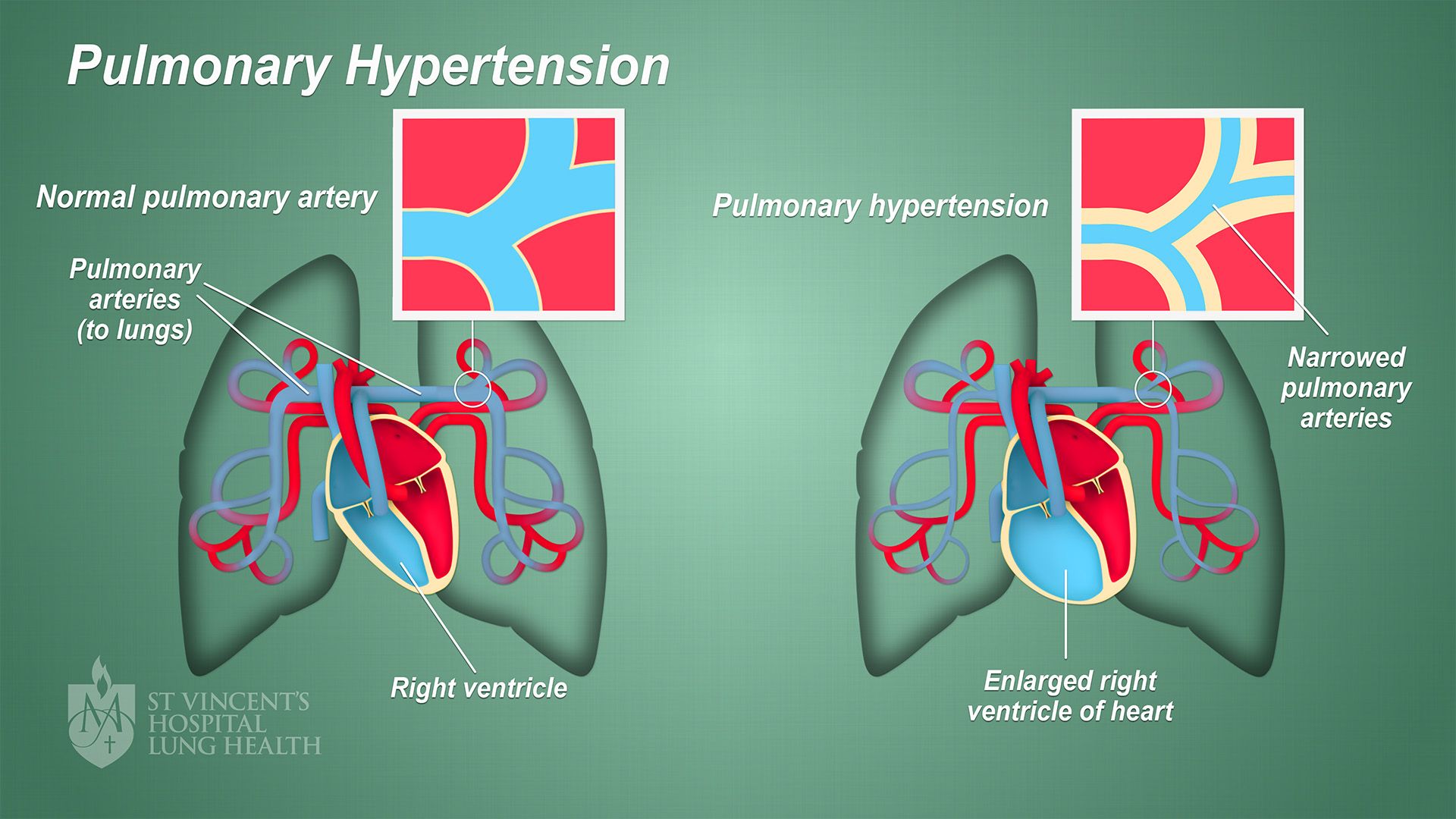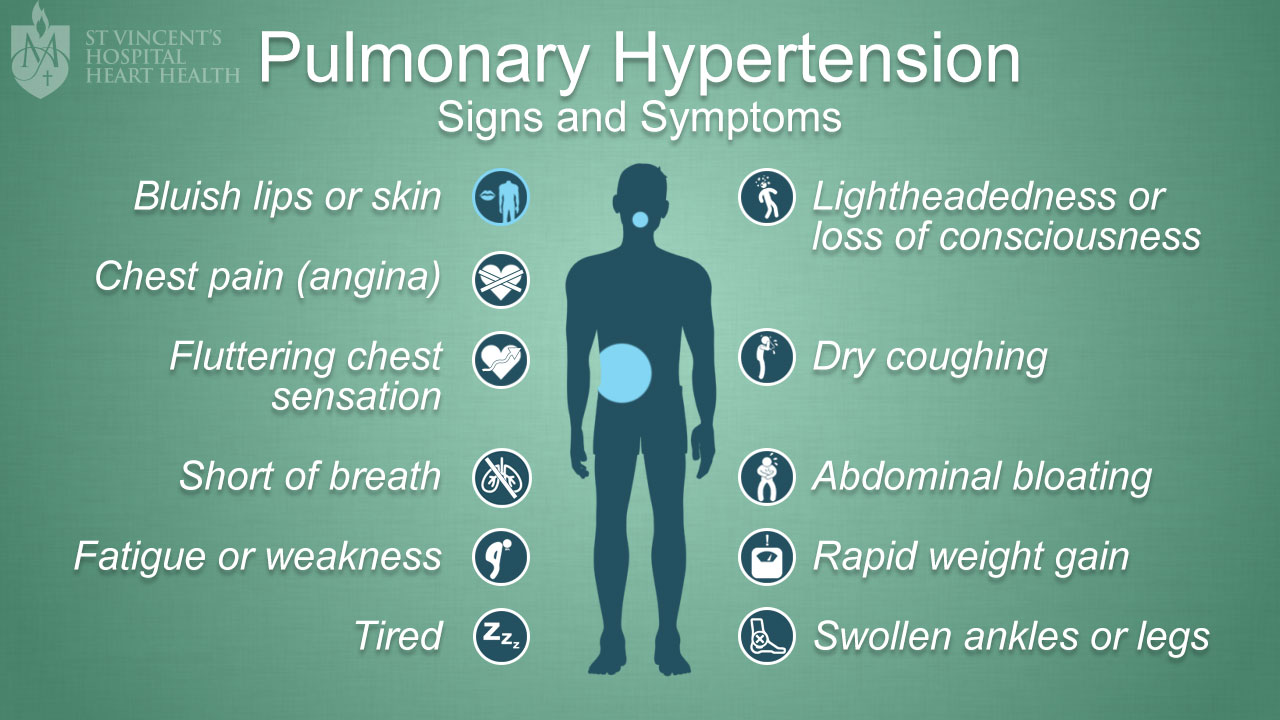Pulmonary Hypertension
Pulmonary hypertension is a type of high blood pressure affecting the arteries that supply blood to your lungs.
What is your pulmonary artery?
What is pulmonary hypertension?
What are the causes of pulmonary hypertension?
What are the signs and symptoms of pulmonary hypertension?
What are the possible tests and procedures for pulmonary hypertension?
What are the possible treatments for pulmonary hypertension?
What is the future plan if you have pulmonary hypertension?
What is your pulmonary artery?
Your pulmonary artery carries blood from the right side of your heart into your lungs.
What is pulmonary hypertension?
Pulmonary hypertension is a type of high blood pressure affecting the arteries that supply blood to your lungs. If the arteries becomes narrow or stiff, your heart can struggle to pump blood into your lungs – and, as a result, the right side of your heart needs to work harder and may get bigger.
The image below illustrates pulmonary hypertension.

What are the causes of pulmonary hypertension?
It’s not always easy to find out what causes pulmonary hypertension. There are several causes, but some of the most common causes are:
- Autoimmune diseases, such as scleroderma or systemic lupus erythematosus (SLE)
- Certain medications and drugs
- Heart defects from birth (also known as congenital heart disease)
- Genetics
- Lung disease, such as pulmonary fibrosis or chronic obstructive pulmonary disease (COPD)
- Liver disease
- Sleep apnoea (where your breathing stops when you’re asleep)
- Clots in the lungs (pulmonary embolism)
- HIV
What are the signs and symptoms of pulmonary hypertension?
Some of the common signs and symptoms of pulmonary hypertension are outlined in the diagram below:


What are the possible tests and procedures for pulmonary hypertension?
If your doctor suspects you have pulmonary hypertension, you’ll be asked about your family and medical history. Your doctor will carefully examine you, and may recommend some tests, including:
- Chest X-ray – this will show if your pulmonary arteries and the right side of your heart are bigger than they should be
- ECG – an ECG can reveal if the right side of your heart is bigger or strained
- 6 minute walk test – this test will indicate your level of exercise tolerance
- Echo – an Echo helps your doctor to see the size and thickness of the right side of your heart, and check how well your heart is working
- Ventilation perfusion scan (VQ scan) – this scan can reveal blood clots in your lungs
- Right heart catheterisation – this measures the pressure in the right side of your heart and lungs
- Cardiac catheter (left heart catheterisation) – this test may be done to look at other causes of your symptoms
- Pulmonary angiogram
- Lung function tests – to see how well your lungs are working and measure how much air you’re breathing in and out
- Chest CT – to take pictures of your heart, lungs and blood vessels
- Chest MRI – see how your right side of your heart is working and the blood flow in your lungs
- Sleep studies – to measure your oxygen levels while you’re asleep
- Blood tests
What are the possible treatments for pulmonary hypertension?
If you’ve been diagnosed with pulmonary hypertension, there are good treatments available that can help to relieve your symptoms and improve your quality of life.
Some of the treatments your doctor may recommend include:
- Medications – your doctor will recommend an appropriate medication plan for you
- Oxygen therapy – if you level of oxygen is low
- Surgery – including heart, lung or heart-lung transplantation or pulmonary thromboendarterectomy surgery (balloon pulmonary angioplasty might be possible if your pulmonary hypertension is caused by clots in your lungs)
What is the future plan if you have pulmonary hypertension?
It is important that you see a doctor who specialises in the care and treatment of pulmonary hypertension. Your doctor will work out the best way to manage your condition, and you’ll be given a treatment plan which is important to understand and follow. This may include:
- Making healthy lifestyle changes – your doctor may recommend that you make changes to your lifestyle, which can include eating a healthy diet, quitting smoking, reducing your alcohol intake and exercising regularly at a safe level
- Weighing yourself daily – increase in weight may indicate that you are retaining fluid and your condition may be worsening, so it’s important to weigh yourself every day, be aware of any changes in your weight and report these changes to your doctor
- Connecting with others – there are support groups for patients with pulmonary hypertension, and you may like to consider joining a support group, for example pulmonary rehabilitation. Some useful websites that can help you to connect with others are the Pulmonary Hypertension Association Australia and Pulmonary Hypertension Association (USA)
It’s a promising time for patients with pulmonary hypertension, due to the rapid increase in therapies available. For more information about the latest treatments, view our Pulmonary Arterial Hypertension book or talk to your medical team about the most reliable resources. As this is a rapidly-evolving field, information can become outdated quite quickly.
The specialised staff at St Vincent’s Hospital Pulmonary Hypertension Clinic is one of the country’s leading pulmonary hypertension clinics, and our staff are committed to continuing advances in treatment to help you live a fulfilling, healthy life.
Pulmonary hypertension clinical trails at St Vincent's Hospital
St Vincent’s Hospital is at the forefront of pulmonary hypertension research and treatment.
We regularly provide opportunities for people to participate in clinical trials to improve medical advances in pulmonary hypertension.
What is a clinical trial?
A clinical trial is a study that investigates how people respond to a new treatment, test or intervention. Clinical trials help us determine if new treatments are safe and effective.
Why are clinical trials important?
Clinical trials are essential for developing new treatments and advancing health care. Clinical trials an also give study volunteers access to free drug treatments before drugs are approved and available on the Pharmaceutical Benefits Scheme (PBS).
Would you like to participate in a Pulmonary Hypertension (PAH) clinical trial?
We currently have vacancies in our pulmonary hypertension clinical trials at St Vincent’s Hospital. For all enquiries, please contact Professor Anne Keogh or Associate Professor Eugene Kotlyar.